Dynamic Skills Software
The ready-to-use system of truth
Our platform provides a world-class Dynamic Skills Software. Don’t let your skills and competency data remain unused inside a spreadsheet. Get the ability to create or extend your competency frameworks, customize job profiles, assign learning and development options, govern workflow and collaborate with other talent management applications.
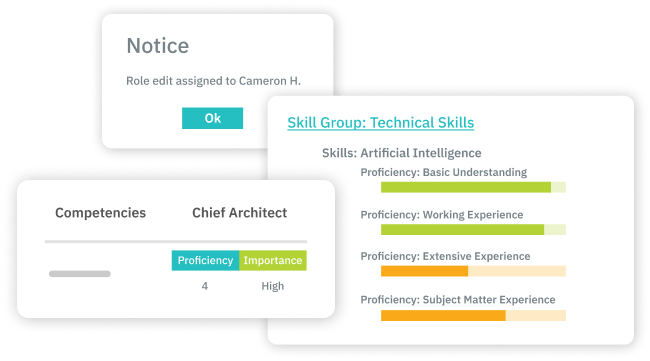
Dynamic Skills Software
When setting up your organization for success, it’s crucial to focus on both current and future skill needs. Dynamic skills software helps you achieve this by providing real-time insights into the evolving skills landscape, ensuring your organization remains agile and competitive.
Organizations that manage talent based on dynamic skills—skills updated in real time—have a significant edge in performance and workforce management. Dynamic skills software automates the process of gathering vast amounts of data and updating a skills cloud, allowing for continuous skill updates that keep your company ahead of the curve.
There are three main approaches to managing skills in your organization:
- Reactive
- Predictive
- Dynamic
Traditionally, many organizations use a reactive approach, updating their skills database only when a need arises. This method is flawed because it often leaves organizations scrambling to find the right talent or retrain employees to meet unexpected demands.
To counter this, many businesses have shifted to a predictive approach, developing talent in advance to fill anticipated skill gaps. While this method is more forward-thinking, it still falls short. Predicting future skill needs can be challenging, especially in fast-changing industries, and many companies struggle to gather and analyze the necessary data to make accurate forecasts.
The solution lies in adopting a dynamic approach to skill management. Dynamic skills software automates skill updates and continuously analyzes data to reflect current industry demands. This allows organizations to quickly identify skill gaps and adjust their talent strategy in real time. Instead of relying on outdated skills databases or inaccurate predictions, dynamic skills software ensures that your organization is always prepared for future needs.
By leveraging dynamic skills software, your business can stay ahead of industry shifts, effectively manage talent, and ensure that the right skills are always in place to meet your evolving objectives.
To learn more about TalentGuard’s Workforce Intelligence Platform, request a demo.
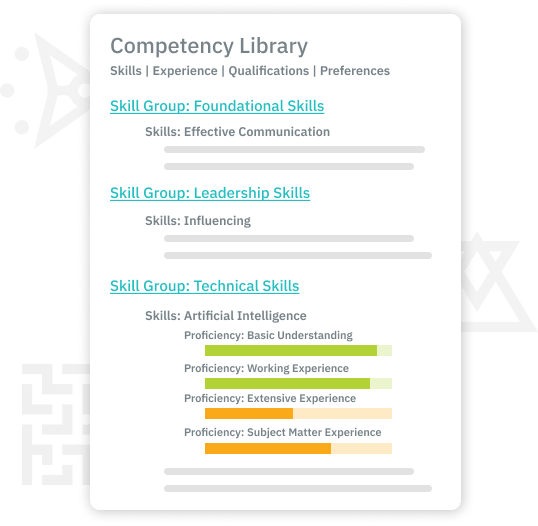
Create
Ability to create, edit and compare multiple competencies, including: Skills, Experiences, Qualifications and Preferences that are required for job functions.
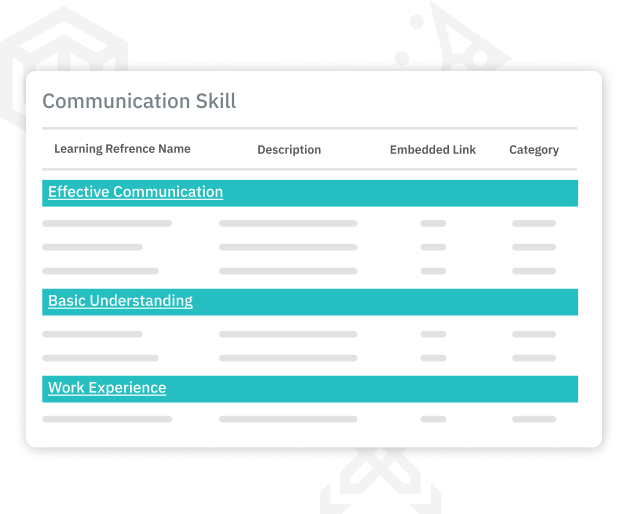
Map
Ability to map competencies, job grades, learning resources and other data to job profiles.
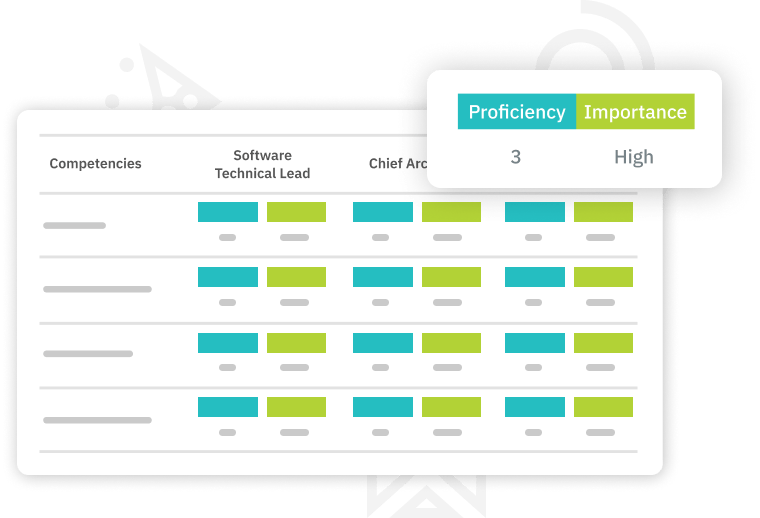
Calibrate
Job Profile calibration includes adjusting the level of proficiency and importance level of associated competencies across job profiles and grade levels.
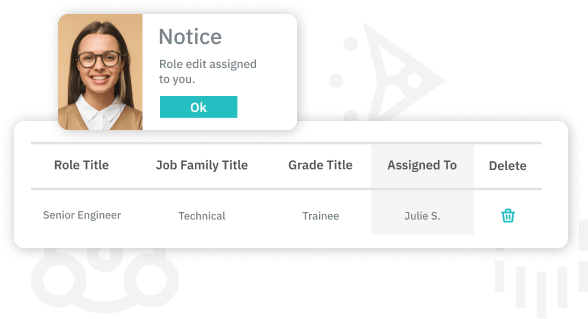
Govern
Manage entitlement, rules, roles and policies to seamlessly govern job role data.
Get Your Free Demo & See our Platform in Action
Select from one of the bundles below and we will tailored the demo to your needs. Let us show you how TalentGuard’s solutions adapt to your industry.
Automate
Create skill profiles, create detailed job descriptions, align learning content with specific skills, and chart clear career path progressions to set the foundation for effective talent management.
Automate includes:
- Create Skill and Competency Profiles
- Develop Job Descriptions
- Map Learning to Skills and Competencies
- Map Career Path Progressions
Assess
Effectively assess their employees’ skills, identify gaps, and implement strategies to develop a skilled and competent workforce prepared to meet current and future challenges.
All the Automate features plus the ability to:
- Create a Skills Inventory
- Conduct Gap Analysis
Engage
Organizations can significantly enhance their talent development strategy and workforce effectiveness by assessing employee skills, curating personalized learning paths, recommending appropriate career paths, and tracking career goals.
All the Automate features plus the ability to:
- Assess Employee Skills and Competencies
- Curate Personalized Employee Learning Paths
- Recommend Employee Career Paths
- Track Career Goals
Optimize
Building talent pools, measuring employee performance, tracking certifications, and conducting multi-rater feedback enhance talent management, ensure compliance, and foster organizational leadership development.
All the Engage features plus the ability to:
- Build Talent Pools
- Measure Employee Performance
- Track Employee Certifications
- Conduct Multi-Rater Leadership Feedback
Trusted by:




Your workforce is changing. Never be unprepared again.
Read our eBook
Dynamic Skills Examples
The Dynamic Skills Theory by Dr. Kurt Fischer dives into the way that human beings develop skills. It’s not just the development process or the way that a person develops particular expertise, but also the way they approach it and what they gain from the learning experience. It’s a psychological approach to understanding how developing these skills impacts the employee and the workforce. There are other factors at play besides the simple mastering of a skill, such as motivation, self-esteem, and the way the skill correlates to other aspects of work and life.
It is difficult to take a dynamic approach to skills management because there is such a wide swath of data that needs to be updated continuously. Not only do you need a comprehensive way to gather information, but you also need excellent reporting options to help you easily identify key insights. The changing dynamics in skills add another layer to the puzzle.
For managers and HR professionals, an important component is finding solutions to be able to train people quickly while the need is still there. With dynamic skills software, you’re able to gain real-time updates at a glance. You can develop processes that help your employees see and make use of training opportunities that benefit them. Additionally, you can find opportunities to allow your staff the growth potential they need to thrive and maintain the highest level of engagement.
Skills to Put on Resume
If you search “dynamic skills” and related terms, you’re bound to see an entry for skills to put on a resume. This is, of course, one of the ways that hiring managers find candidates to interview for open positions. For employees, the skills they gather in their current position are crucial to help them grow professionally, therefore that is something they’re looking for in a fulfilling role.
For job seekers, skills may just represent expertise to put on a resume and assess the job responsibilities for a role. While your employee might want to use the tools of your software to help them highlight their own resume and CV experience, you’ll be able to use these features to build a better organization.
The soft skills on resumes should have a higher priority than many employees or hiring managers might assume. While the hard skills for resumes are often those highlighted for a position, the soft skills are what help you understand how the employee will function in a team environment. For the employee, these are the skills that will truly help them excel in a team environment, because they speak to the way the employee works with others, delegates tasks, and meets deadlines.
Dynamic skills software solutions help your organization keep track of both types of skills. This is an excellent resource for both the organization and the employee. A full picture helps management place employees in the right position for them to flourish. It also helps the employee plan their career trajectory and determine which skills need to be addressed to move in the direction they desire.
An organization that uses dynamic skills software can foster a more growth-centric environment among staff, support initiatives to promote from within, and create a much healthier and happier company culture. Employees can use these tools to help them understand the different roles within your company and the industry as a whole. It provides a way to assess current expertise and motivates upward growth.
Why the Dynamic Skills Approach Is the Better Methodology
The dynamic skills approach makes sense of the wealth of data your organization compiles on employee skills. It gives you an automated approach and a user-friendly application. This allows everyone from your management to your individual employees a more convenient and accurate way to monitor, maintain, and improve skills.
Your organization can use dynamic skills software to arrive at more accurate predictions for the skills you need as the industry moves and pivots. For your organization, this means that you’ll be better prepared to maintain a workforce that meets your needs today, tomorrow, and in six months.
The dynamic skills approach will help you identify the skills you currently have, create training programs for future growth, and keep an eye on the industry as a whole. This will help you pivot proactively when needed so that your management and staff are more efficient and productive.
If you’re ready to see how TalentGuard can help implement your organization’s dynamic skills approach, request a preview today.
